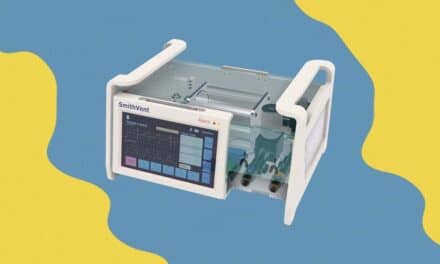The U.S. FDA has granted Denver, N.C.-based BioMedInnovations LLC (BMI) an Emergency Use Authorization (EUA) to manufacture and distribute SuppleVent, the company’s back-pressure regulator-based ventilator technology. BMI is working in collaboration with Lawrence Livermore National Laboratory (LLNL) and with partners, Equilibar Precision Pressure Control and Roush Yates Manufacturing Solutions, a division of Roush Yates Engines, to help address the need for life-saving healthcare equipment for those experiencing acute respiratory distress syndrome and other serious breathing difficulties.
“BMI is pleased with the FDA’s decision, which underscores the applicability of the core technology in our organ perfusion system,” says BioMedInnovations CEO Sherif Gabriel. “In partnership with Lawrence Livermore National Laboratory, we were able to quickly design a machine with minimal components that is easy to assemble in an effort to help COVID-19 patients and healthcare providers who are in need of highly efficient, value-added ventilators.”
LLNL and BMI pursued a reversed design approach, a methodology guided by anticipated supply chains and ease of assembly. With this mindset, the partnership brought a design forward to full test spanning clinically relevant PIP, PEEP, I:E, RR and FiO2. The machine is a simple assembly of components with an interface that includes full alarms and low power operation from a compressed gas source.
“This is a truly unique system which, importantly, was designed with the provider experience in mind. All of the external components can be quickly sterilized, and internal components have been sourced to ensure biocompatibility with oxygen concentrations,” says Jhamyie Cappiello MS RRT-ACCS RCP, an educator in respiratory care services at Duke University Hospital. “It requires little maintenance, can be rapidly deployed, and is operated following very simple inputs for inhalation and exhalation pressures.
The SuppleVent ventilator is designed to accept 50psi compressed air or oxygen mix and is powered by a standard 110V/220V AC outlet or an optional DC battery supply. The device is created to accommodate a standard 22 mm ventilator circuit outfitted with either a mask or endotracheal tube.
“It is spectacular to have an opportunity to contribute to the collective efforts to address patients in need during this COVID-19 global pandemic,” says Jack Kotovsky, a LLNL engineer who spearheaded this ventilator effort. “All of us want to contribute and help individuals in all dimensions of this global pandemic and being able to produce a piece of durable equipment that will directly benefit human life is very exciting.”





